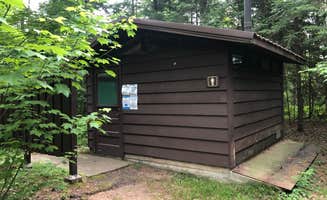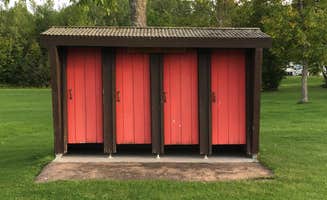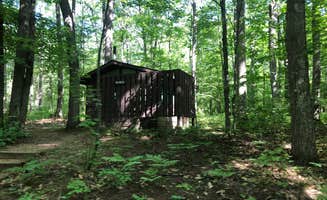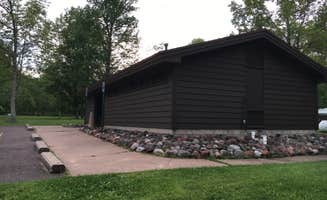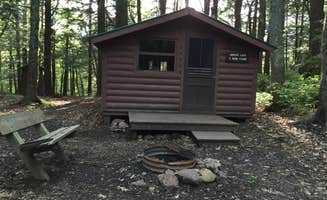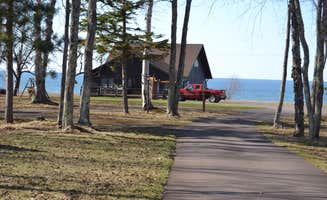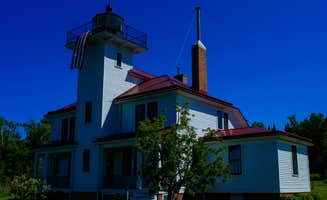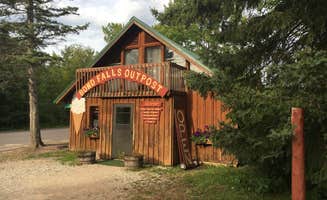Porcupine Mountains Wilderness State Park sits on the southwestern shore of Lake Superior, with terrain features ranging from 600 to 1,958 feet above sea level. The area experiences long winters with substantial snowfall, often reaching 200+ inches annually. Summer temperatures typically range from 65-75°F with cool evenings, creating ideal conditions for campers looking to escape summer heat while exploring this heavily forested region near Ironwood, Michigan.
What to do
Waterfall hiking: 4 miles round trip. The Black River Harbor Recreation Area features a series of five major waterfalls along the Black River. "This is a beautiful area to visit even if it is just for a day, but just a days visit will leave you wanting to comeback for more," notes a visitor to Porcupine Mountains Backcountry Camping. The trails between falls include wooden stairs and viewing platforms.
UTV trail access: direct from campground. Frontier RV Park provides immediate access to UTV trails leading into Wisconsin. "If your looking for a place to ride its," mentions one camper at Frontier RV Park and Campground, who appreciated the direct trail connections. The campground serves as a convenient base for motorized exploration with gas available on-site.
Copper Peak exploration: 30-minute drive. This ski flying facility offers summer viewpoint access. "Copper Peak, the only ski flying facility in North America. In the summer you can ride up to the top to see pretty far. It's not for the faint of heart, you really can't mind heights if you are going up there," explains a visitor to Black River Harbor Recreation Area. The facility offers panoramic views of three states and Canada on clear days.
What campers like
Private waterfront sites: minimal neighbors. Several Lake Superior shoreline campsites provide remarkable isolation. "LS-16, the hike was better than day 1 though travel consisted of hiking long sketches on small pebbles. The site is directly on lake superior, we made it in time for a beautiful sun set. The water was crystal clear and great for swimming, cooking, and cleaning," notes a Porcupine Mountains Backcountry camper, highlighting the rewards of more remote glamping near Ironwood.
Well-spaced campsites: room to spread out. Campers appreciate the generous site spacing at Lake Gogebic State Park Campground. "Stayed here for 3 nights over the July 4th weekend 2020. Had a great site right on the lake, fire pit was 10 feet from the water, most sites are large with trees but not many are very level," explains a visitor. This spacing creates privacy not always found at more developed campgrounds.
Clean facilities: well-maintained bathrooms. Despite being rustic, many campgrounds maintain excellent facilities. "The site has some of the best maintained restrooms and showers I have seen. The proximity to the Porcupine Mountains is another plus," notes a Lake Gogebic visitor. This attention to cleanliness makes primitive camping more comfortable for those seeking wilderness glamping experiences.
What you should know
Weather fluctuations: rapid changes. The Lake Superior shoreline experiences sudden weather shifts. A camper at Ottawa National Forest Black River Harbor Campground notes, "I did a 3 day/2 night hike during peak color... I was warned the Lake Superior trail was muddy when I checked in, and the ranger was not joking - I was grateful to have trekking poles to help balance on logs, branches, roots and rocks." Waterproof footwear and layers are essential year-round.
Insect preparation: varying intensity. Mosquitoes can be prolific, particularly in early summer. "The Mosquito Coast... Lake Gogebic State Park is an ok campground compared to others I have visited. A big minus for me were the millions of mosquitoes, but I guess that comes as part of the 'nature package'," advises a camper. Bug spray with high DEET concentration proves essential from late May through July.
Limited cell service: disconnected experience. Most campgrounds have minimal to no cellular coverage. "With no Verizon cell service, this is a nice night's stopover for us," mentions a camper at Schomberg Park. This lack of connectivity creates an authentic wilderness experience but requires advance planning for navigation and emergency communications.
Tips for camping with families
ATV wash stations: clean equipment. Families with ATVs appreciate the dedicated washing facilities at Schomberg Park. "The coin operated atv wash is $1 for a minute. Bathrooms were extremely clean and well kept. Sites have electric no water hookups at the site. Fill of station is across from site 1," notes a visitor. This amenity helps maintain equipment after muddy trail rides.
Beach access: swimming options. Several campgrounds offer kid-friendly swimming areas. "The beach area was nice with a nice big sandy beach for the kids," mentions a Lake Gogebic camper. These designated swimming areas provide safer alternatives to the often cold and unpredictable Lake Superior shoreline.
Playground availability: on-site entertainment. For families seeking upscale glamping near Ironwood with amenities, certain campgrounds include playgrounds. "Large playground, biking, hiking," notes a Frontier RV Park visitor. These facilities provide children with activity options during downtime between wilderness adventures.
Tips from RVers
Site levelness: bring blocks. Many campsites in the region require leveling equipment. "Sites were grass, a little un-level but were very spacious. These pull-thru sites were water and electric only (30 amp) and the water pressure was a little low," explains a visitor to Alpine Campground & RV Park. Leveling blocks are essential gear for most RV sites in the region.
Limited full hookups: tank management. Most campgrounds offer partial hookups only. "There is a convenient dump station on the way out of the park," notes an Alpine Campground visitor. RVers should plan water usage accordingly and expect to use dump stations rather than sewer connections at most locations.
Narrow access roads: size restrictions. Some forest campgrounds have limited access for larger rigs. "About 5 miles in on a dirt road, but the sites are pretty nice and secluded," explains a Henry Lake Campground visitor about the access road. RVers should research road conditions and turning radius requirements before booking at more remote locations.


